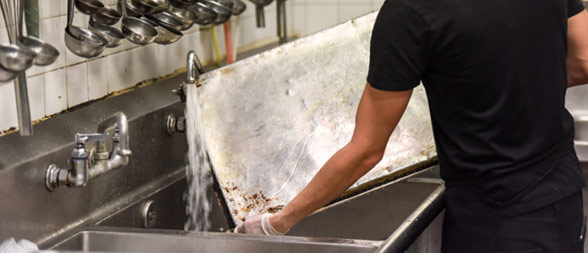Commercial Grease Trap Cleaning & Repair Phoenix

Busy businesses like restaurants, hotels, diners, and the like often have to deal with the inevitability of dealing with clogged grease traps – and the effect of a clogged grease trap on the day to day business operations can be truly a hassle. Grease traps are engineered to collect fats, oils, and grease (or FOG) before gray water can be released to city sewer lines.
The main problem with FOG is when the temperature is cool enough; FOG begins to solidify, forming a hard, solid layer that can easily clog the insides of pipes and even the biggest drain holes. In short, FOG is a problem if your grease trap is barely cleaned, or hasn’t been cleaned at all in recent years. Don’t wait until your grease trap is inoperable as the costs of repair and cleaning tend to increase the more you wait.
Calling companies like Brewer Commercial Plumbing Services early for a free inspection and expert advice will ensure that your grease trap is operating well below its maximum capacity, and your plumbing system is healthy. No plumbing issues mean unimpeded business operations, and this helps produce a better outlook for your business in the long term.
Ideally, grease traps should be checked daily or weekly. But since this isn’t feasible for many businesses, regular monthly inspections (at the very least) with companies like Brewer Commercial Plumbing Services is a must. It is also important to remember why we do this in the first place – releasing a large quantity of raw FOG into the environment doesn’t help anyone and also harms the environment.
When your grease trap needs servicing, expect the following: inspection of the grease trap, possible draining if about one-fourth of the grease trap is filled with FOG, baffle inspection and cleaning, and proper disposal of collected FOG. FOG cannot be dumped just anywhere as per city and state regulations.
To make sure that your grease traps will always operate at optimum levels, always schedule regular grease trap maintenance with Brewer’s, ensure that sinks that come into contact with grease, fats, and other food wastes are connected to the grease trap, make sure that the grease trap is the proper size based on how much water passes through daily, provide basic training to your staff so that most of the food waste and related particles are separated and removed before water is used to wash utensils, plates, and other items, and most importantly, maintain your cleaning log to ensure that your business is up to code.
Ultimately, being mindful of your grease trap will save you from lots of headaches and you will be helping the environment immensely by properly disposing of FOG the way it should be disposed of – in landfills, and not mixed with water, which ultimately finds its way to bodies of water like rivers and the ocean. As parting advice – let the grease traps function the way they are supposed to and avoid pouring hot water down the drains as this liquefies the FOG and this increases the grease content of gray water (which shouldn’t be the case).